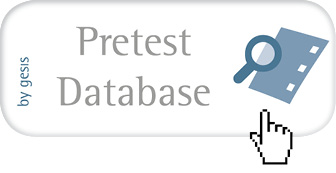We support you in Cognitive Pretesting
Cognitive Pretesting - Our Service at a Glance
Cognitive Pretesting - Our Service in Detail
Research tested Items in our Pretest Database
Articles in the GESIS Survey Guides:
Selected Items:
- Incorporating eye tracking into cognitive interviewing to pretest survey questions
- A Comparison of Two Cognitive Pretesting Techniques Supported by Eye Tracking
- Pretesting Survey Questions Via Web Probing – Does it Produce Similar Results to Face-to-Face Cognitive Interviewing?
- Effects of the number of open-ended probing questions on response quality in cognitive online pretests
- How effective are eye-tracking data in identifying problematic questions?
- Question order effects in cross-cultural web probing: Pretesting behavior and attitude questions
- Open-ended versus closed probes: Assessing different formats of web probing
- An experimental test of the effectiveness of cognitive interviewing in pretesting questionnaires
- The effects of open-ended probes on closed survey questions in web surveys

